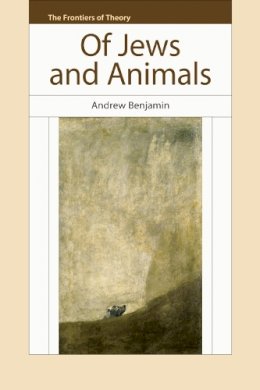
Stock image for illustration purposes only - book cover, edition or condition may vary.
Of Jews and Animals
Andrew Benjamin
€ 136.53
€ 135.31
FREE Delivery in Ireland
Description for Of Jews and Animals
Hardback. In developing his own conception of the 'figure', Andrew Benjamin has written an innovative and provocative study of the complex relationship between philosophy, the history of painting and their presentation of both Jews and animals. Series: The Frontiers of Theory. Num Pages: 208 pages, 13 black & white illustrations. BIC Classification: AGH; DSA. Category: (P) Professional & Vocational. Dimension: 241 x 165 x 18. Weight in Grams: 456.
By developing his own conception of the 'figure' Andrew Benjamin has written an innovative and provocative study of the complex relationship between philosophy, the history of painting and their presentation of both Jews and animals. As Benjamin makes clear the 'Other' is never abstract. He underscores the means by which the ethical imperative, arising from the way the history of philosophy and the history of art are constructed, shows us how to respond to an already identified, even if unacknowledged, determinant other.
By developing his own conception of the 'figure' Andrew Benjamin has written an innovative and provocative study of the complex relationship between philosophy, the history of painting and their presentation of both Jews and animals. As Benjamin makes clear the 'Other' is never abstract. He underscores the means by which the ethical imperative, arising from the way the history of philosophy and the history of art are constructed, shows us how to respond to an already identified, even if unacknowledged, determinant other.
Product Details
Publisher
Edinburgh University Press
Number of pages
208
Format
Hardback
Publication date
2010
Series
The Frontiers of Theory
Condition
New
Number of Pages
208
Place of Publication
Edinburgh, United Kingdom
ISBN
9780748640539
SKU
V9780748640539
Shipping Time
Usually ships in 5 to 9 working days
Ref
99-10
About Andrew Benjamin
Andrew Benjamin is Professor of Critical Theory and Philosophical Aesthetics and Director of the Research Unit in European Philosophy in the Faculty of Arts at Monash University. His most recent books are Writing Art and Architecture (re:press Books, 2009) and Style and Time: Essays on the Politics of Appearance (Northwestern University Press, 2006).
Reviews for Of Jews and Animals
Andrew Benjamin has written an original and provocative meditation on the place of the 'figure' of the animal in modern philosophy and culture. The book is remarkable for its sensitivity to the issue of visibility and the use of visual material. The engagement with the philosophical history of art is beautifully sustained and serves not only to work through the theme of figuration but also to make the philosophical narrative available to a wider range of readers.
Howard Caygill, Goldsmith's College A stimulating book which will help those readers who, interested in the work of Agamben and the late Derrida, wish to reflect more on the image of the animal in classical continental philosophy.
Peter Fenves, Northwestern University Of Jews and Animals is set to become a key text, alongside such works as Elisabeth de Fontenay's Le silence des betes (1998) and Jacques Derrida's The Animal That Therefore I Am (2006), in constituting a further and necessary move beyond the utilitarianism and neo-Kantianism within which 'animal philosophy' has for so long remained mired.
Richard Iveson, Goldsmiths, University of London Parallax Andrew Benjamin has written an original and provocative meditation on the place of the 'figure' of the animal in modern philosophy and culture. The book is remarkable for its sensitivity to the issue of visibility and the use of visual material. The engagement with the philosophical history of art is beautifully sustained and serves not only to work through the theme of figuration but also to make the philosophical narrative available to a wider range of readers. A stimulating book which will help those readers who, interested in the work of Agamben and the late Derrida, wish to reflect more on the image of the animal in classical continental philosophy. Of Jews and Animals is set to become a key text, alongside such works as Elisabeth de Fontenay's Le silence des betes (1998) and Jacques Derrida's The Animal That Therefore I Am (2006), in constituting a further and necessary move beyond the utilitarianism and neo-Kantianism within which 'animal philosophy' has for so long remained mired.
Howard Caygill, Goldsmith's College A stimulating book which will help those readers who, interested in the work of Agamben and the late Derrida, wish to reflect more on the image of the animal in classical continental philosophy.
Peter Fenves, Northwestern University Of Jews and Animals is set to become a key text, alongside such works as Elisabeth de Fontenay's Le silence des betes (1998) and Jacques Derrida's The Animal That Therefore I Am (2006), in constituting a further and necessary move beyond the utilitarianism and neo-Kantianism within which 'animal philosophy' has for so long remained mired.
Richard Iveson, Goldsmiths, University of London Parallax Andrew Benjamin has written an original and provocative meditation on the place of the 'figure' of the animal in modern philosophy and culture. The book is remarkable for its sensitivity to the issue of visibility and the use of visual material. The engagement with the philosophical history of art is beautifully sustained and serves not only to work through the theme of figuration but also to make the philosophical narrative available to a wider range of readers. A stimulating book which will help those readers who, interested in the work of Agamben and the late Derrida, wish to reflect more on the image of the animal in classical continental philosophy. Of Jews and Animals is set to become a key text, alongside such works as Elisabeth de Fontenay's Le silence des betes (1998) and Jacques Derrida's The Animal That Therefore I Am (2006), in constituting a further and necessary move beyond the utilitarianism and neo-Kantianism within which 'animal philosophy' has for so long remained mired.
